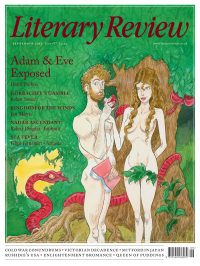Richard Davenport-Hines
File Bodies
The Secret Twenties: British Intelligence, the Russians and the Jazz Age
By Timothy Phillips
Granta Books 375pp £20
Intelligence gathering and intelligence analysis are distinct and complementary skills. It is not enough for agents to collect informative material if there are no desk officers able to interpret the data. The Secret Twenties exemplifies the perils of a mismatch between copious, accurate information and less reliable analysis. Timothy Phillips has delved into the MI5 files of the 1920s that have been released to the National Archives. These files are a wonderful source of social history, he has found, because they contain, among other things, correspondence intercepted under Home Office warrants. His beavering has produced good stories, with colourful personalities and a great deal of derring-do. He is an accomplished raconteur who tells his tales with a brisk pace, a sharp eye for detail and a sense of absurdity. His lively enthusiasm about his discoveries makes this book a rattling good read. But the inferences he draws from the evidence and the overall interpretation that he offers do not match the quality of the storytelling.
One case study concerns Winston Churchill’s cousin Clare Sheridan, a sculptor, journalist and parlour communist. Phillips tells with gusto the story of her romance with the leading Bolshevik revolutionary Lev Kamenev, the monitoring and compromising of Kamenev by MI5 and Sheridan’s visit to Russia. Another case study centres on Andrew

Sign Up to our newsletter
Receive free articles, highlights from the archive, news, details of prizes, and much more.@Lit_Review
Follow Literary Review on Twitter
Twitter Feed
Margaret Atwood has become a cultural weathervane, blamed for predicting dystopia and celebrated for resisting it. Yet her ‘memoir of sorts’ reveals a more complicated, playful figure.
@sophieolive introduces us to a young Peggy.
Sophie Oliver - Ms Fixit’s Characteristics
Sophie Oliver: Ms Fixit’s Characteristics - Book of Lives: A Memoir of Sorts by Margaret Atwood
literaryreview.co.uk
For a writer so ubiquitous, George Orwell remains curiously elusive. His voice is lost, his image scarce; all that survives is the prose, and the interpretations built upon it.
@Dorianlynskey wonders what is to be done.
Dorian Lynskey - Doublethink & Doubt
Dorian Lynskey: Doublethink & Doubt - Orwell: 2+2=5 by Raoul Peck (dir); George Orwell: Life and Legacy by Robert Colls
literaryreview.co.uk
The court of Henry VIII is easy to envision thanks to Hans Holbein the Younger’s portraits: the bearded king, Anne of Cleves in red and gold, Thomas Cromwell demure in black.
Peter Marshall paints a picture of the artist himself.
Peter Marshall - Varnish & Virtue
Peter Marshall: Varnish & Virtue - Holbein: Renaissance Master by Elizabeth Goldring
literaryreview.co.uk